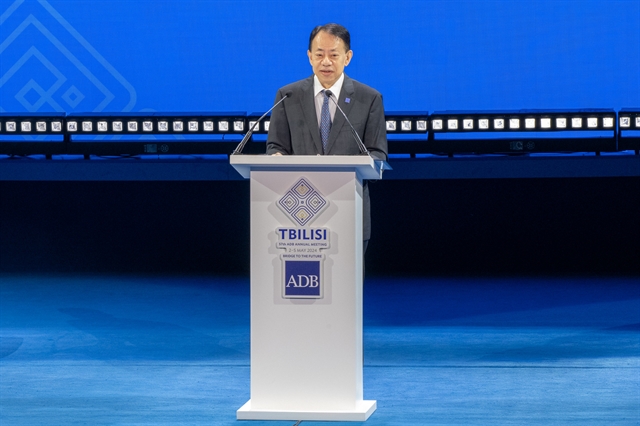 Economy
Economy

 |
| ADB President Masatsugu Asakawa delivered a speech during the opening ceremony of the ADB Board of Governors meeting held in Tbilisi on May 4. Photo courtesy of ADB |
Vũ Hoa
TBILISI It is time to reduce emissions associated with the global value chain, ADB President Masatsugu Asakawa said during the opening ceremony of the ADB Board of Governors meeting held in Tbilisi Saturday.
The Opening Session marks the start of the Annual Meeting, a high-profile event attended by the guest of honour from the host country.
The theme for the 57th Annual Meeting, held from May 2 through May 5, is 'Bridge to the Future'.
“Our presence in this room demonstrates how deeply interconnected our world is. We should celebrate this," Asakawa said.
"We should also use these connections to build a greener and more open economy. It might be easy to look back at the pandemic or the current geopolitical tensions and conflicts and conclude that globalisation is dead. I don't believe that.”
Asakawa noted that it is true that global trade and supply chains are vulnerable to shocks.
He added: “But the answer cannot be protectionism and segmentation. Free trade and the free movement of capital have benefited our region for decades, and this must be a step forward. So let's look at how to deepen regional cooperation to improve supply chain resilience, promote cross-border trade, encourage private sector investment, and strengthen financial and tax cooperation.”
Asakawa also stressed the importance of finding ways to decarbonise global supply chains.
He said: “Trade-related activities account for up to 30 per cent of global carbon emissions. The uncomfortable truth is that our contribution to greenhouse gas emissions is rising amid strong economic growth in Asia. Now is the time to act to reduce global value chain emissions for a more sustainable future.”
"Coordination is needed to address challenges. We come together at a time when the people of our region face challenges that demand our close attention and coordination. The impacts of climate change are unrelenting, and the risks from conflict and crisis can quickly undermine their livelihoods and even their survival.
"This is why development cannot stand still. It requires us to evolve to face the realities in front of us and prepare for the challenges on the horizon. These meetings invite us to reflect deeply on this call to action."
He also believed that ensuring equitable utilisation of digital technology is crucial.
"Artificial Intelligence offers tremendous potential to drive growth and help address development challenges in healthcare, agriculture and climate change. But, developing countries will miss out if they are not able to adopt this technology. There are also risks from AI, such as bias and lack of transparency," he said.
According to the president, ADB is working hard to strengthen the capacity of our developing member countries to deploy responsible AI solutions that follow an ethical framework and drive inclusive growth.
"We believe that bridging the digital divide, and opening opportunities from AI, are key to a more prosperous future," Asakawa added. VNS




